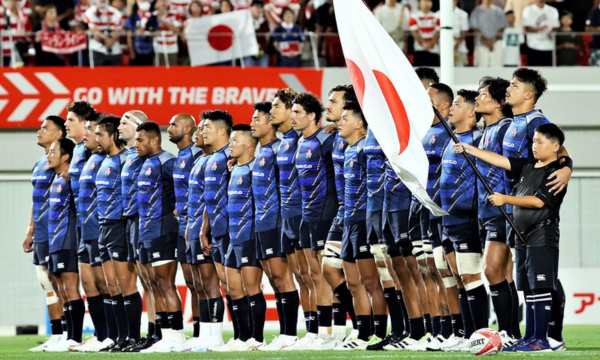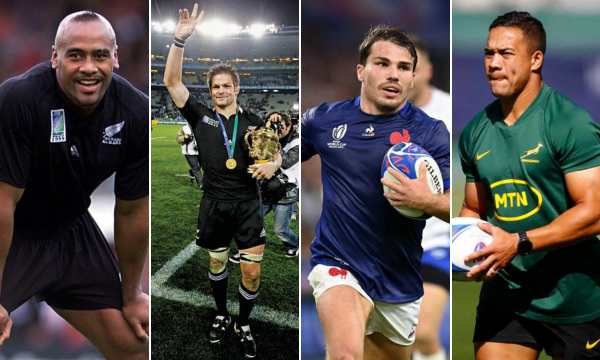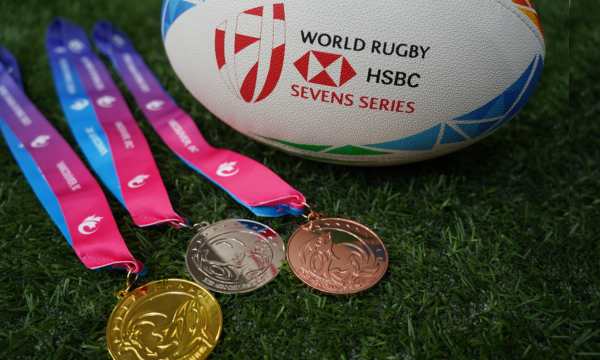Rugby World Cup: Discover the Most Anticipated Rugby Championship
The Rugby World Cup is an event that turns entire nations into passionate fans every four years!
Anúncios
This monumental tournament represents the pinnacle of world rugby, bringing together the best teams on the planet in epic matches for sporting glory.
For true sports fans, nothing compares to the thrill of following every tackle, try, and drop goal that decides the fate of the teams in this legendary competition.
Get ready to discover all the fascinating details of this event that transcends mere sport and becomes part of the cultural identity of dozens of nations.
Why is the Rugby World Cup the Most Important Tournament in the Sport?
The Rugby World Cup has earned its status as the supreme event in rugby for reasons that go beyond the pitch.
Held every four years, it brings together the top 20 teams in the world after a rigorous global qualification process.
Its importance transcends mere sporting aspects, becoming a cultural and economic phenomenon for the host countries.
For players, representing their country in the Rugby World Cup means the pinnacle of a professional career.
No other rugby tournament combines the historical prestige, global visibility, and fierce competitiveness of this quadrennial championship.
It defines generations of players and inspires millions of young people to venture into rugby around the globe.
How the RWC Works: Understanding the Format and Scoring System
The structure of the Rugby World Cup has been meticulously designed to combine excitement, competitive fairness, and the appreciation of rugby tradition.
The tournament brings together 20 teams divided into four groups of five teams each, with the initial phase in a round-robin format.
The top two teams from each group advance to the quarter-finals, starting the electrifying knockout phase.
From there, each match becomes an early final, requiring absolute concentration from the athletes, as there is no second chance for the defeated.
The scoring system in the group stage follows the international rugby standard: 4 points for a win, 2 for a draw, and no points for a loss.
Additional bonuses are awarded with 1 extra point for teams that score four or more tries or lose by a margin of up to 7 points.
Each edition of the Rugby World Cup features approximately 48 matches spread over about six weeks of competition.
The tournament balances tradition and modernity, maintaining its consistent format while incorporating innovations such as the TMO (Television Match Official) to ensure precise refereeing decisions.
Host Countries of the Rugby World Cup
The selection of hosts for the Rugby World Cup has always been strategic, balancing rugby tradition with global expansion.
Since its debut in 1987, when Australia and New Zealand shared the organization, the tournament has set high standards for subsequent hosts.
- England (1991)
- South Africa (1995)
- Wales (1999)
- Australia (2003)
- France (2007)
- New Zealand (2011)
- England (2015)
Japan broke paradigms in 2019 as the first Asian host country, expanding the sport’s boundaries. France brilliantly hosted the 2023 edition, setting new records for attendance and revenue.
Australia will host in 2027, while the United States will host the tournament for the first time in 2031, marking a new phase of expansion into promising markets. Benefits for Host Countries:
- Development of lasting sports infrastructure.
- Boost in tourism during and after the event.
- Global visibility for six consecutive weeks.
- Growth of rugby among the local population.
- Economic boost for smaller cities also involved.
The criteria for hosting the Rugby World Cup include adequate stadiums, transportation infrastructure, sufficient accommodations, and a genuine commitment to the sport’s development.

Rugby-World-Cup-Japan-2019-(Source-Google)
Favorite Teams: Who Are the Powerhouses of the Championship?
In the pantheon of the Rugby World Cup, few nations have managed to achieve supreme glory, evidencing a clear hierarchy in the sport.
New Zealand leads with three titles (1987, 2011, and 2015), consolidating the All Blacks as the ultimate reference in world rugby.
South Africa matched this feat with historic victories in 1995, 2007, and 2023. The Springboks have turned rugby into a powerful symbol of national unity and historical overcoming.
Australia, with its titles in 1991 and 1999, completes the trio of southern hemisphere powerhouses that have dominated the Rugby World Cup for decades.
England, champion in 2003, remains the only northern hemisphere representative to lift the Webb Ellis Cup.
France, Ireland, and Argentina remain emerging forces, constantly challenging the traditional powerhouses of the RWC.
Fiji, Samoa, Japan, and Georgia represent the new frontier of international rugby, with memorable performances that inspire other developing nations.
New and Old Players Who Made History
The Rugby World Cup has served as a stage for the emergence of legends that have transcended generations and borders.
Jonah Lomu revolutionized the concept of a winger with his unprecedented combination of size, strength, and speed in the 1995 edition, setting records that remain to this day.
Richie McCaw led the All Blacks to two consecutive victories (2011 and 2015), embodying the values of leadership and resilience.
South African Siya Kolisi inspired millions as the first black captain to lift the trophy in 2019, repeating the feat in 2023.
Players like Jonny Wilkinson, whose precise kicks secured England’s title in 2003, or Bryan Habana, with his incredible 15 tries in just two editions, defined entire eras of the tournament.
Dan Carter remains the top scorer in Rugby World Cup history.
The new generation includes stars like Antoine Dupont, Cheslin Kolbe, and Maro Itoje, who are redefining their positions for contemporary rugby.
Each edition of the RWC provides a stage for new stars to emerge, ensuring the continued fascination the tournament holds for fans of all ages.

Lomu-McCaw-Dupont-and-Kolbe-(Source-Google)
Unforgettable Moments: The Finals That Stopped the Rugby World
The history of the Rugby World Cup is filled with memorable finals that transcended the sport and captured global attention.
The 1995 final in South Africa remains an iconic moment when Nelson Mandela, wearing the Springboks jersey, handed the trophy to François Pienaar after their victory over New Zealand.
Jonny Wilkinson’s dramatic drop goal in the final seconds of extra time against Australia in 2003 entered the sport’s folklore.
The extreme tension of that moment perfectly represents the psychological pressure of a Rugby World Cup final.
The All Blacks’ redemption in 2011, breaking a 24-year drought on their own turf with a narrow 8-7 victory over France, highlighted the weight of national expectations.
South Africa’s dominant performance against England in 2019 demonstrated perfect tactical planning for decisive occasions.
The 2023 final between South Africa and New Zealand, pitting the two greatest RWC powerhouses against each other, provided an extraordinary defensive spectacle.
Spectacular Records That Impressed at the RWC
The Rugby World Cup has produced extraordinary athletic and statistical feats that demonstrate the sport’s continuous evolution.
New Zealander Simon Culhane set an improbable record in 1995 by converting 20 kicks in a single match against Japan, scoring 45 individual points.
Australian Chris Latham holds the record for the most meters gained in an edition (500+ meters in 2003), showcasing his exceptional offensive ability.
Jonah Lomu and Bryan Habana share the record for eight tries in a single edition, setting nearly unattainable standards of offensive efficiency.
New Zealand holds the highest score in a Rugby World Cup match, with an impressive 145-17 against Japan in 1995.
South African Cobus Reinach scored the fastest hat-trick in history against Canada in 2019, with three tries in just 11 minutes.
England’s Jason Leonard participated in four Rugby World Cup editions (1991-2003), demonstrating exceptional longevity in the high-impact sport.
South Africa set a unique record by winning three finals without ever losing in the decisive game, highlighting their ability to perform under extreme pressure.
Beyond the Sport: The RWC’s Legacy in Today’s World
The impact of the Rugby World Cup extends far beyond the 80 minutes of each match, transforming communities and influencing generations.
The “Impact Beyond” program implemented by World Rugby since 2013 ensured substantial investments in sports development in host nations and neighboring regions.
The Japanese edition of 2019 resulted in a 750% increase in youth participation in local rugby, with more than 1.8 million new practitioners.
The social aspect is also positively impacted, with programs like “Try for Change” in England and “Rugby for All” in France promoting inclusion through sport.
The women’s Rugby World Cup has grown exponentially, inspiring thousands of girls to join a sport previously dominated by men.
France 2023 set a new paradigm with its “Charter of Social and Environmental Commitments,” becoming the first RWC with a positive carbon footprint.
The fundamental values of rugby – respect, integrity, solidarity, passion, and discipline – are actively promoted through educational initiatives that accompany the tournament.
Conclusion
The Rugby World Cup transcends its sporting dimension to establish itself as a global cultural phenomenon that unites nations in celebration of rugby’s fundamental values.
The quadrennial competition not only crowns the best team in the world but also serves as a powerful agent of social transformation, driving the sport’s development in new territories.
For millions of fans, each edition represents an emotional journey filled with unforgettable moments that resonate for generations.
The enduring legacy of this extraordinary tournament will continue to enrich lives and cross cultural boundaries, perpetuating the unique magic that only the world’s greatest rugby competition can provide.
FAQ
What was the biggest surprise in the tournament’s history?
Why is the trophy called the “Webb Ellis Cup”?
Why do some teams perform ritual dances before games?
What are the main terms I need to know to understand the game?
How does the women’s RWC compare to the men’s?
 7 Bigger Rugby Fields Every Fan Should Know
7 Bigger Rugby Fields Every Fan Should Know
Pure adrenaline, tradition and unforgettable victories: that’s what great rugby fields are all about. Anúncios Have you ever stopped to think about the rugby fields that […]
Keep reading World Rugby Sevens: Get to Know Everything About the Olympic Tournament
World Rugby Sevens: Get to Know Everything About the Olympic Tournament
Discover the electrifying energy of World Rugby Sevens and get ready to fall in love with this dynamic sport. Anúncios This championship combines speed, skill and […]
Keep reading How to Watch Live Rugby on DAZN: Your Complete Guide
How to Watch Live Rugby on DAZN: Your Complete Guide
Ready to feel the excitement of live rugby without leaving your couch? Experience the adrenaline with the Dazn App! Anúncios If you’re someone who cheers for […]
Keep reading